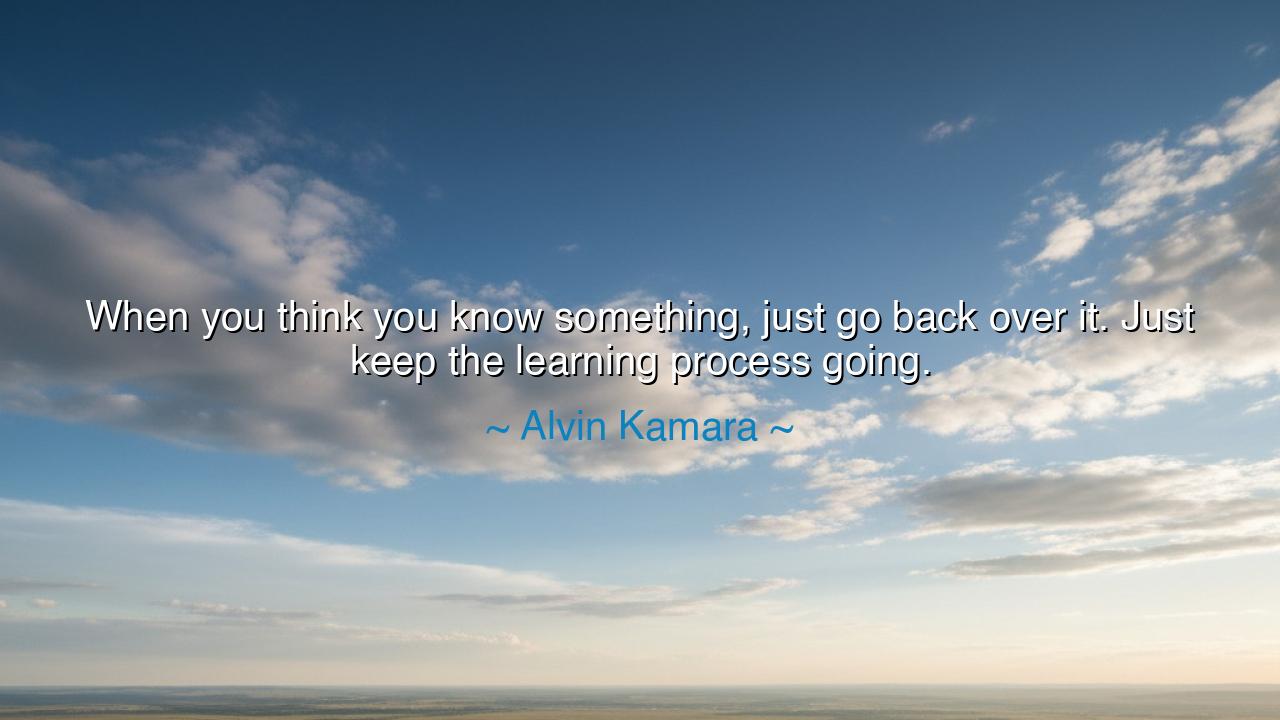
When you think you know something, just go back over it. Just
When you think you know something, just go back over it. Just keep the learning process going.






“When you think you know something, just go back over it. Just keep the learning process going.” — Alvin Kamara
In these humble yet powerful words, Alvin Kamara, the athlete and thinker of perseverance, offers a truth that stretches beyond the playing field and into the heart of all wisdom. His message, though spoken in the language of sports, belongs to the eternal discourse of the ancients — that learning is never finished, that mastery is a horizon which retreats as we approach it. Kamara’s words remind us that to know is not to arrive, but to begin again; that the wise are those who remain forever students, revisiting what they believe they understand, refining it, deepening it, and humbling themselves before its infinite complexity.
The origin of this truth can be traced to Kamara’s own craft — the art of excellence in motion. In the sport of football, repetition is the rhythm of mastery. The athlete who ceases to practice what he already knows soon discovers that skill fades when not sharpened. But Kamara’s insight goes far beyond muscle memory. He speaks of the mind’s discipline, the humility to revisit one’s knowledge not out of doubt, but out of reverence for the endless depths of understanding. The world, he implies, rewards not those who claim to know, but those who return again and again to the foundations, finding new meaning in what seemed simple yesterday.
The ancient philosophers spoke much the same. Aristotle said that the mark of an educated mind is to entertain an idea without accepting it blindly. Socrates, who was called the wisest of men, declared that his wisdom lay in knowing that he knew nothing. What Kamara expresses in the language of modern life is the same timeless humility that guided the great seekers of truth — that knowledge is a living thing, and that every time we revisit what we think we know, we discover that it has changed, or rather, that we have changed. The process of learning is not linear; it is a circle that ascends, a spiral that returns us to the same point at a higher understanding.
Consider the example of Leonardo da Vinci, who, though hailed as a master painter, engineer, and inventor, never ceased to study. His notebooks overflowed with sketches of anatomy, geometry, flight, and shadow — not because he was ignorant, but because he knew that perfection is found only in constant renewal. Leonardo once wrote, “Learning never exhausts the mind.” He understood what Kamara teaches in his own way: that knowledge, once gained, must be revisited, challenged, and rediscovered. For even the greatest knowledge grows stale if it is not refreshed by curiosity.
There is also in Kamara’s words a quiet warning against the arrogance of completion. How often do men and women stop growing because they believe they have arrived? The scholar closes his book; the craftsman lays down his tools; the leader ceases to listen — and in that very moment, they begin to decline. The one who believes he knows all things has sealed the tomb of his own progress. But the one who returns to the basics, who studies again what is familiar, who questions what he once accepted — that one will forever ascend, for his learning process never ends. Such humility is the root of greatness, for it keeps the mind supple and the soul alive.
In the quiet repetition of practice, whether in art, in sport, or in thought, lies the secret of transformation. Kamara’s wisdom reminds us that every time we “go back over” something, we are not simply reviewing — we are seeing it anew, through the lens of experience. The same lesson, when approached again and again, reveals hidden depths. The teacher may repeat his words, but the student hears them differently, because he himself has changed. Thus, to learn is to grow, and to grow is to return — again and again, until knowledge becomes wisdom, and wisdom becomes life itself.
So, dear seeker, take this truth into your own path: when you think you know something, do not rest. Go back over it. Revisit the words you’ve read, the skills you’ve practiced, the beliefs you hold most dear. Question them, refine them, rebuild them. Do not fear the circle of repetition, for within it lies the ascent to mastery. Whether you are a student, an artist, a teacher, or a leader, let humility be your companion and curiosity your constant guide. For as Alvin Kamara reminds us, learning is not a destination but a way of being — a rhythm of returning and rising, a lifelong pilgrimage toward the truth that deepens each time we dare to look again.






AAdministratorAdministrator
Welcome, honored guests. Please leave a comment, we will respond soon